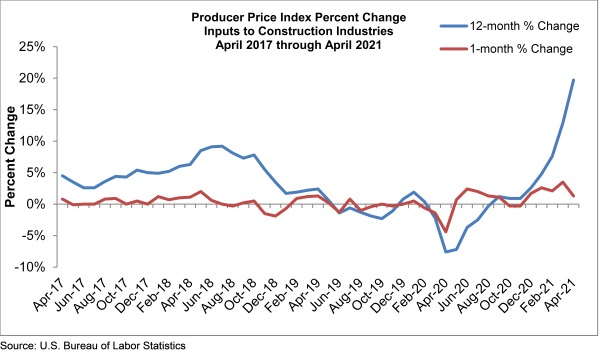By Associated Builders and Contractors
Construction input prices increased 1.3 percent in April compared to the previous month, according to an Associated Builders and Contractors analysis of U.S. Bureau of Labor Statistics Producer Price Index data. Nonresidential construction input prices increased 1.6 percent for the month.
Construction input prices are 19.7 percent higher than a year ago, and nonresidential construction input prices expanded 19.2 percent over that span. All three energy subcategories have experienced significant year-over-year price increases. The price of crude petroleum rose 245.2 percent, while unprocessed energy materials and natural gas increased 117.7 percent and 114.6 percent, respectively. Softwood lumber prices have increased 121.1 percent over the past year.
“Over the past several weeks, the major challenge facing the U.S. nonresidential construction industry has shifted from COVID-19-induced disruptions to the ongoing surge in materials prices,” said ABC Chief Economist Anirban Basu. “Nonresidential input prices have surged, and much of that increase has occurred since the start of 2021. While some of this is attributable to so-called base effects—the result of unusually low prices that prevailed a year ago for certain commodities—it has become clear that supply is unable to keep pace with rapid demand growth in many instances, driving prices uncomfortably higher.”
“Though ABC’s Construction Confidence Index has remained reasonably stable to date, there is growing concern in the industry regarding another bout of project postponements as higher costs induce project owners to delay construction,” said Basu. “With the global economy steadily reopening, central banks continuing to pump up money supply, governments engaging in deficit spending and supply chain disruptions persisting, contractors can expect significant price pressures for months to come. While materials prices will capture headlines today, construction labor costs are also rising rapidly, further jeopardizing the recovery of nonresidential construction spending during the months ahead.” (Source)

